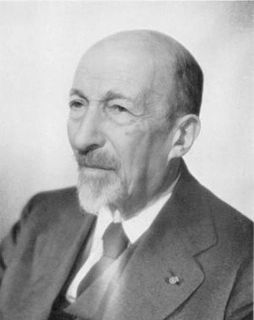A Quote by Jacques Hadamard
The object of mathematical rigor is to sanction and legitimize the conquests of intuition, and there was never any other object for it.
Related Quotes
An absolute can only be given in an intuition, while all the rest has to do with analysis. We call intuition here the sympathy by which one is transported into the interior of an object in order to coincide with what there is unique andconsequently inexpressible in it. Analysis, on the contrary, is the operation which reduces the object to elements already known.
They [the mathematicians of the Enlightenment] defined their terms vaguely and used their methods loosely, and the logic of their arguments was made to fit the dictates of their intuition. In short, they broke all the laws of rigor and of mathematical decorum. The veritable orgy which followed the introduction of the infinitesimals... was but a natural reaction. Intuition had too long been held imprisoned by the severe rigor of the Greeks. Now it broke loose, and there were no Euclids to keep its romantic flight in check.
As we speak of poetical beauty, so ought we to speak of mathematical beauty and medical beauty. But we do not do so; and that reason is that we know well what is the object of mathematics, and that it consists in proofs, and what is the object of medicine, and that it consists in healing. But we do not know in what grace consists, which is the object of poetry.
Object in/ and space - the first impulse may be to give the object - a position - to place the object. (The object had a position to begin with.) Next - to change the position of the object. - Rauschenberg's early sculptures - A board with some rocks on it. The rocks can be anywhere on the board. - Cage's Japanese rock garden - The rocks can be anywhere (within the garden).
Well, think of what I’m doing to you right now. For me I’m the self, and you’re the object. For you, of course, it’s the exact opposite—you’re the self to you and I’m the object. And by exchanging self and object, we can project ourselves onto the other and gain self-consciousness. Volitionally.” “I still don’t get it, but it sure feels good.” “That’s the whole idea,” the girl said.







































